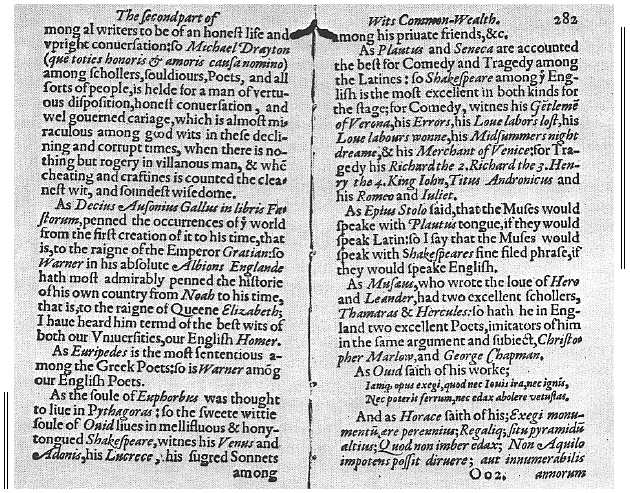The first rave review
Francis Meres, one year younger than Shakespeare, described himself as "Maister of Arte of both Universities"; in 1598, Meres published a work which has proven most valuable in dating Shakespeare's plays, for he mentions many of them, and in the most laudatory terms.
In Palladis Tamia, Wits Treasury, Meres begins by praising Shakespeare's poetry -- the two narrative poems, Venus and Adonis and The Rape of Lucrece, and the Sonnets -- then compares Shakespeare to Plautus in comedy and to Seneca in tragedy:
As the soul of Euphorbus was thought to live in Pythagoras*, so the sweet witty soul of Ovid lives in mellifluous and honey-tongued Shakespeare, witness his Venus and Adonis, his Lucrece his sugared Sonnets among his private friends, etc.
Meres continues:
As Plautus and Seneca are accounted the best for Comedy and Tragedy among the Latins, so Shakespeare among the English is the most excellent in both kinds for the stage...
. . . for Comedy, witness his Gentlemen of Verona, his Errors, his Love['s] Labours Lost, his Love Labours Won*, his Midsummer Night's Dream, and his Merchant of Venice; for Tragedy his Richard the 2, Richard the 3, Henry the 4, King John, Titus Andronicus, and Romeo and Juliet.
Meres goes on to refer to Marlowe, Chapman, and many other writers, several of whom were playwrights, but he does not lavish quite the same degree of praise on them.
Meres was, however, atypical of University men in his seemingly uncritical approval of English writers in general and English dramatists in particular.
Footnotes
-
Pythagoras
Pythagoras believed in the transmigration of souls.
-
Love's Labours Won?
The mention of an unknown play--"Love's Labour's Won"--has stimulated much speculation. If Meres is not referring to a play now lost, the most likely candidate is The Taming of the Shrew, an early comedy that Meres does not mention, in which Petruchio certainly seems to win Love's labour, even if Kate might be thought to lose it; Much Ado About Nothing and As You Like It (in both cases likely to be early drafts) have both been suggested. There is some evidence that an early quarto of a play called "Loves Labours Won" was actually published, but, if so, no copy has survived.
